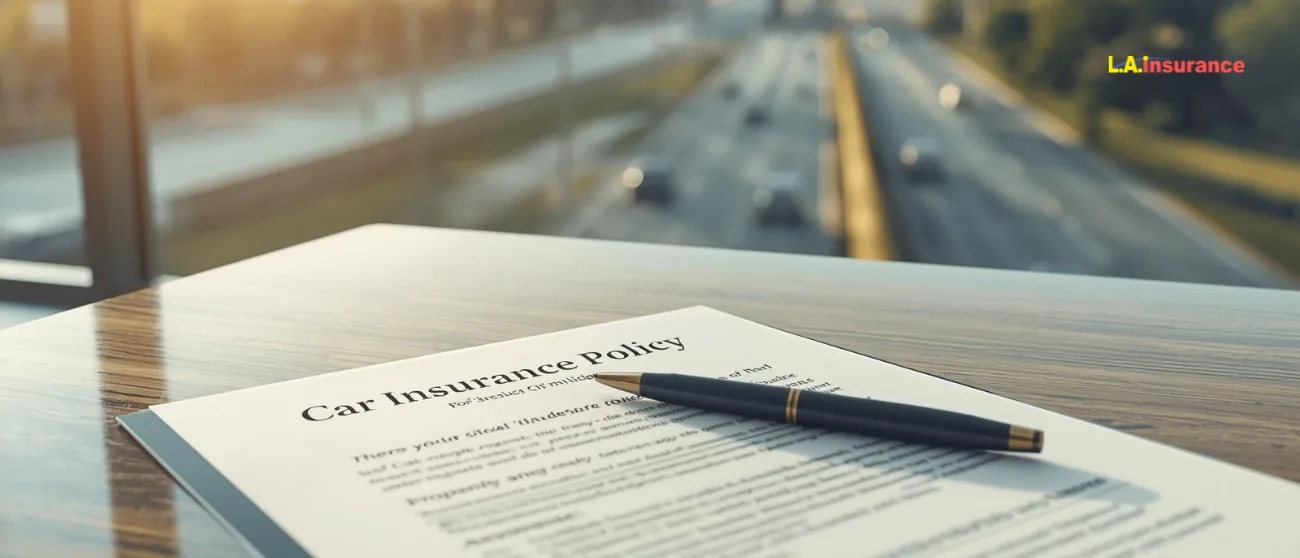
Publish Date: 22-10-2025
Renter's insurance
How to Get Renters Insurance
If you’re a tenant living in an apartment, townhouse, single-family home, or condominium, one question may cross your mind: How do I get renters insurance to protect my belongings?
It’s a common concern among renters, and the data backs it up. According to the insurance quote comparison site The Zebra, more than half of U.S. renters (55%), equivalent to 61 million people, have renters insurance policies. And 75% of them carry it because their landlord requires it.
This means if you’re renting a home, there’s a strong chance your lease agreement will mandate renters insurance. Even if it’s not required, having a policy is still a smart decision to protect your personal belongings from liability, theft, water damage, vandalism, or natural disasters.
And you might feel clueless, particularly if you’ve never purchased renters insurance before. In this article, we’ll walk you through how to get tenant insurance step by step, so you’ll know exactly what to do.
How Can I Get Renters Insurance: 5 Easy Steps
Whether you want to get renters insurance online or shop onsite, buying renters insurance is much simpler than most people think. You don’t need a lawyer, a stack of paperwork, or hours of research. All it takes is following a few clear and easy steps. And once you understand how it actually works, you can secure your insurance policy in less than a day.
Here are the 5 easy steps to follow to obtain renters insurance successfully:
Step 1: Figure Out How Much Coverage You Need
First, you should start by looking around your property and making a quick inventory of your belongings. Furniture, electronics, kitchen appliances, gadgets (e.g., laptop, camera), or any high-value items like jewelry, art collections need to be included. You can use either a Google Sheet or an Excel Sheet for that. You can also use inventory apps like Itemtopia or NAIC Home Inventory.
However, the fastest way to document everything you own is to take photos and videos of each room. Once you’re done, this can give you a ballpark idea of how much personal property coverage you’ll need. And don’t forget to consider your pet (if you have any) or high-value items.
Learn more about how much renters insurance you need so you can figure out your specific coverage needs and requirements. But if you're completely new to renters insurance, we recommend reviewing our guide on what is renters insurance and what it covers. This will help you make a better decision before purchasing a renters policy.
Step 2: Get Renters Insurance Quotes
Once you decide on how much coverage you need, request renters insurance quotes from a few insurance companies. Most providers let you do this online with your zip code and basic information. However, it would be easier for you if you prepare this info ahead of time. Most companies ask for:
- Your name, address, and zip code
- Details about your property (apartment, condominium, or rental home)
- Whether your landlord requires renters insurance
- An inventory or estimate of your personal property coverage needs
- Your preferred deductible amount
- Safety features in your home (e.g., locks, alarms, smoke detectors, fire extinguishers)
- Information on pets that might affect liability insurance (may also ask for breeds)
- Your contact information and payment details
So, upon providing this information, you’ll receive your renters insurance quotes almost instantly.
Step 3: Compare What Renters Insurance Covers
Each insurance company structures its renters insurance coverage differently. One provider might include water damage protection, but with lower policy limits. Another may offer liability coverage that includes lawsuits related to incidents in your rental space, provided you're legally responsible.
However, these policies may come with limited compensation, which is how some insurers offer cheaper quotes. So, don’t be fooled by low prices alone. It’s important to compare what’s actually covered and how much protection you’re getting for the cost.
That’s why we recommend getting quotes from at least three providers so that you can compare the costs and the coverage they offer. Kindly remember, some insurance covers only property damage and theft, while others also protect against loss of use (AKA ALE), water damage, or even liability insurance if someone files a lawsuit after an injury. So while comparing quotes, make sure to consider factors like price, policy limits, actual cash value vs. replacement costs, and types of renters insurance coverage included.
It's also essential to check whether additional coverage, such as flood insurance, umbrella insurance, pet liability, high-value item riders, or identity theft protection are available if you need them.
Apart from that, you should also review the insurance provider itself by reading reviews and recommendations from insurance forums and social media platforms. If you’re in Michigan or another state (e.g., Texas, Florida, Colorado), you can consider L.A. Insurance for protecting your personal property from most risks, including theft, fire, vandalism, or water damage.
Step 4: Decide on Your Renters Deductible and Payment
Like any insurance policy, renters insurance has a deductible. This is the amount you pay out of pocket before each successful claim. And the remaining amount is paid out by your insurer.
Please note that for personal property coverage, you need to choose a deductible that typically ranges from $250 to $2,500. According to Safehome.org and Insurance Information Institute (III), the most common and popular deductible amount for renters is $500. However, usually you have the option to choose from $250, $500, $1,000, $1,500.
And while choosing a deductible amount, understand how it affects your premiums. A higher deductible usually lowers your monthly renters insurance cost, but you’ll pay more if something happens. So, here you should choose a level that fits your budget and makes sense for your expenses.
Please note that renters liability insurance doesn’t require any deductible.
Once you choose your deductible, pick the right payment option that is flexible for you. Generally, renters insurance carriers offer flexible monthly, semi-annual, and annual payment options. And they usually don’t require any down payments. Still, every insurance company is different. So, talk through it with your chosen insurer.
Step 5: Buy Your Renters Insurance Online or Through an Agent
And finally, it’s time to lock in your coverage. You can buy renters insurance online in less than 30 minutes or work with a local agent if you prefer. Once purchased, you’ll get your insurance quote finalized and your contract (or proof of coverage) ready. Some landlords may even require renters insurance before you sign the lease, so this step can also speed up your move-in.
As we just mentioned, it doesn’t take much time to buy renters insurance coverage. Learn more about how long does it takes to get renters insurance online or through an agent.
What to Do After You Buy Renters Insurance?
There are things that you need to do right after you purchase renters insurance. By doing so, you can get the most out of your new insurance coverage. These small actions can save you headaches later and keep your landlord happy.
Update Your Inventory
Your personal property coverage is based on what you own. Keep a fresh inventory of your furniture, electronics, and valuables. Snap photos, record receipts, and store them safely. This makes it easier to file a claim for theft, vandalism, or property damage.
Set Your Policy Start Date
Check the contract details to make sure your insurance policy starts on the right day. If your lease begins next week, confirm that your renters insurance coverage kicks in before you move. That way, you’re protected from the very first day against damage or unexpected expenses.
Add Your Landlord as an Interested Party
Most landlords want proof that you carry renters insurance. Ask your insurance company to list your landlord as an “interested party”. This doesn’t give them control over your policy, but it does notify them if you cancel or change your insurance coverage. It’s a simple step that can also meet a common require renters insurance clause in your lease.
Keep Your Policy Information Handy
Save digital copies of your insurance quote, policy details, and payment receipts. Having everything in one place makes the claims process smoother if you ever face water damage, a storm, or an injury on your property.
Common Mistakes to Avoid When Buying Renters Insurance
Although buying renters is effortlessly simple, there are common slip-ups that can cost you money or leave you unprotected. Here are a few mistakes tenants should watch out for:
Understand Your Coverage Needs
Many renters only guess at their personal property coverage. Without a proper inventory, you might choose a policy that won’t fully cover property damage or theft. Always add up the value of your furniture, electronics, and valuables before buying.
Ignoring What Renters Insurance Covers and Doesn’t Cover
Some renters assume insurance covers everything. But most renters insurance policies don’t include flood insurance, earthquake damage, or normal wear and tear. That’s why you should always review what the insurance companies actually cover and where you may need extra insurance coverage.
Also, don’t forget to choose between ACV (Actual Cash Value) and RCV (Replacement Cost Value), which determines how much compensation you’ll receive from your insurer. The first option is for those who think a depreciated amount is sufficient if any of their rental property is stolen or damaged. Choosing this will result in a cheaper renters insurance quote. RCV, on the other hand, can help you pay the full amount to replace the damaged or lost item. Naturally, selecting this option will be a bit more expensive.
Choosing the Wrong Deductible
A low deductible means a higher monthly cost, while a high one leaves you with a bigger expense at claim time. Pick a balance that matches your budget, not just the cheapest option upfront.
Forgetting Liability Protection
It's risky not to get liability insurance. What if someone suffers an injury in your rental home and files a lawsuit? you could face thousands in damages. So, make sure your renters insurance coverage includes enough liability protection.
Not Comparing Renters Insurance Quotes
It would be a mistake to go for the first quote you see. No matter how cheap and lucrative your first quote is, you should never settle too quickly. Always compare renters insurance quotes from different companies. And don’t just look at the price. Check limits, exclusions, and customer service too.
Overlooking Discounts
Many tenants often miss out on renters insurance discounts. However, you might already be eligible for certain discounts without realizing it. For example, if you purchase renters insurance from the same provider as your auto insurance, they may offer a value-for-money coverage plan. Plus, installing smoke detectors, fire extinguishers, or theft protection devices can help lower your renters insurance costs as well.
If you have a strict budget plan, you are probably thinking about how do I get renters insurance at an affordable price. Let us help you with that as well.
How Can I Get Cheap Renters Insurance: Key Tips
The average cost of renters insurance ranges from $12 to $30 per month, or $144 to $360 per year, which is surprisingly affordable. Yet, if you think you’re overpaying for your renters coverage, follow these simple but effective tips to lower your renters insurance rates effortlessly.
- Bundle your tenant insurance (HO-4 insurance) with car insurance for discounts. Ask your insurance companies about multi-policy savings.
- Raise your deductible if you can afford it. That way, you can lower your monthly or annual premium.
- Add a better security and safety system to earn discounts. This could be adding smoke alarms, deadbolts, and sprinklers.
- Get a renters insurance quote early, go paperless, or pay in full; doing all of that can reduce the costs.
- Compare renters insurance side by side. Use equal limits and deductibles for each insurance quote.
- Choose actual cash value if your budget is tight; however, don’t forget it will pay less than replacement cost.
- Skip extra coverage that you do not need. Add identity theft or water backup only if the risk fits.
- Keep an updated inventory. Right sizing personal property coverage avoids overpaying.
- Timing helps. For instance, starting your policy the next day can help you save a little money.
- Living in a gated community can lower renters insurance costs.
- Re-shop every year or two. Insurance companies change prices, perks, and customer experience.
- Remember location matters. Your zip code often affects your premiums.
How to Obtain a Renters Insurance Quote with L.A. Insurance
Getting your renters insurance quote and buying a policy from L.A. Insurance is super easy. Just fill out the “Request a Quote” form online and send it to us. Our renters insurance agents will review it and provide you with a personalized quote almost instantly. If you find the quote offers great value for the coverage, you can secure your policy the same day.
Over the past 33 years, we’ve built a solid reputation by serving more than 10 million policyholders across the United States. That means you can count on us for reliable, affordable renters insurance with maximum coverage and the lowest monthly or annual premiums. Got questions? Call us at (800) 893-9393. We’re here to help.
How to Buy Renters Insurance Coverage: FAQs
Who needs renters insurance?
Anyone renting a home, apartment, or condominium should consider it. A renters policy provides financial protection to your belongings, covers legal liability, and helps with expenses after damage. Besides, many landlords even require renters insurance as part of the lease.
How do I get renters insurance for an apartment?
You can request a renters insurance quote online or through an agent. Provide your zip code, basic information, and estimated personal property coverage. Once you compare offers, select a policy that matches your cost and coverage needs.
Can I get renters insurance online?
Yes. Most insurance companies let you apply directly on their website. You’ll enter your property details, pick your deductible, and review renters insurance quotes instantly. In many cases, you can finalize payment and download your proof of insurance/contract within a few minutes.
Can I cancel renters insurance at any time?
Yes, most renters insurance policies can be canceled anytime. Contact your insurance company to request cancellation. Some may charge a small fee, while others refund the unused payment. Always confirm with your provider before stopping your policy. Learn more about how to cancel renters insurance.
What does renters insurance cover (coverage and exclusions)?
A renters insurance policy usually covers personal property coverage (theft, vandalism, storm, or smoke damage), liability insurance, and loss of use if you can’t stay in your home. Exclusions often include flood, earthquakes, normal wear and tear, or intentional damage.
What are replacement cost (RCV) and actual cash value (ACV)?
Replacement cost pays to replace an item at today’s price. Actual cash value pays what it’s worth after depreciation. Replacement offers better protection, while ACV is cheaper but may leave you covering more expense out of pocket.
What does renters insurance not cover?
Most renters insurance coverage excludes flood insurance, earthquakes, pest damage, and normal wear and tear. High-value items, like jewelry, may have limited insurance coverage unless you add an endorsement. So, always review your policy to avoid gaps. What is proof of renters insurance, and how to share it?
Proof of renters insurance is usually a policy declaration page or certificate. You can share it by emailing a PDF copy or asking your insurance company to send it directly to your landlord as required by your lease.
Can I get renters insurance by itself?
Yes. You don’t need to bundle it with auto insurance or home insurance. You can buy a standalone renters policy online or through an agent.
How much does it cost to have renters insurance?
On average, renters insurance cost is between $12 and $30 per month. Your zip code, coverage amount, deductible, and risk factors (like pets or safety features) affect the price. Renters insurance discounts can lower the total.
Is renters insurance the same as apartment insurance?
Yes, both terms describe the same insurance coverage. Whether you call it home renters insurance or apartment insurance, it protects your belongings, covers liability insurance, and helps with loss of use (e.g., hotel stays, meals, laundry) if your rental is uninhabitable.
Editorial Disclaimer
The information provided on this blog is for general informational purposes only and does not constitute professional insurance, legal, or financial advice. Coverage and rates are subject to individual eligibility, underwriting guidelines, and state availability. For specific questions regarding your policy or to get an accurate quote, please contact a licensed L.A. Insurance agent directly. We're an independent agency and not a direct insurance carrier. For more information on how we operate and handle your data, please see our Terms and Conditions and Privacy Policy.
Tag :
Renter's insurance








